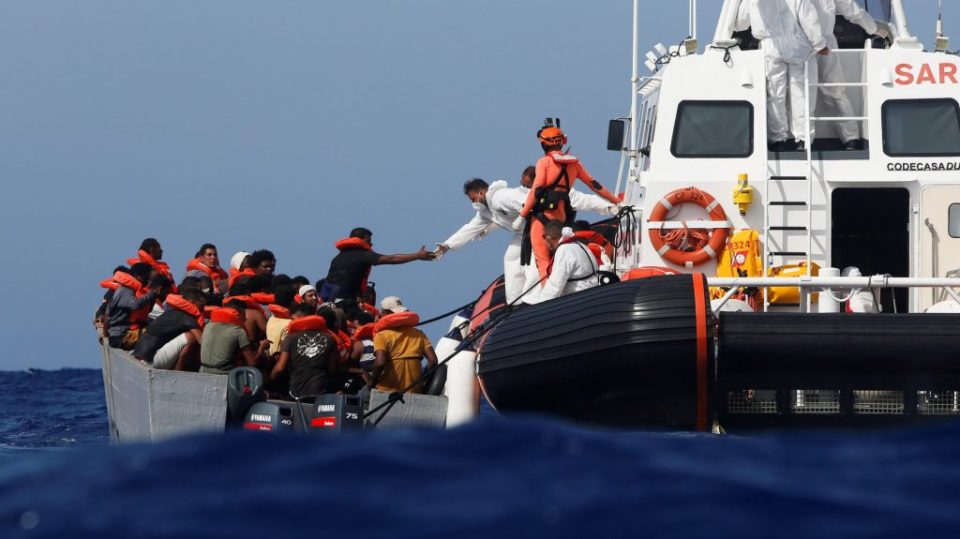BY Giansandro Merli
At around 8 p.m. on Wednesday, Italy’s Council of Ministers approved the legislative decree on immigration that introduces new rules for ships belonging to humanitarian NGOs operating in the Mediterranean. The measure was passed at the same time as another similar one concerning facilities of strategic and national interest. In a logic diametrically opposed to that of Salvini’s “closed ports,” the new regulation guarantees “transit and stopover in national territory” for rescued migrants, provided that the NGOs meet its seven requirements. These will apply only to vessels carrying out search and rescue activities in a systematic manner. Fines for non-compliance go up to €50,000 and punitive measures include the seizure of ships, all the way to their confiscation.
The government’s main goal is to prevent humanitarian NGOs from carrying out multiple rescues during the same mission. Therefore, the port of landing must be requested immediately after the first rescue operation and reached without delay. In addition, the search and rescue operations must not aggravate dangerous situations already present on board, meaning that ships must not continue to patrol international waters in front of the Libyan coastline if they already have shipwrecked people on board; and, in the case of multiple rescue operations, these must still comply with the obligation to notify and the obligation to arrive at the port of landing without delay. The latter provision is ambiguously worded and seems to be intended to hinder the possibility, or rather the duty, to respond to SAR (search and rescue) situations that are still unresolved after having already carried out a rescue.
In order to fully understand the meaning of this provision, we will need to see what will happen at sea, because it is precisely in such cases that the Italian regulations could conflict with international ones that take priority over them. For the past two weeks, the Interior Ministry has adopted the practice of indicating a port of landing – particularly far away – immediately after the first rescue. While Life Support and Sea-Eye 4 were sailing to Livorno, they responded to SOS calls and rescued migrants in distress on two different boats. It is hard to believe that anything would have changed under the new regulations: if a captain doesn’t offer assistance to those calling for help, they are guilty of refusing rescue.
Other points of the new regulations require ships to comply with certain conditions of safety and seaworthiness in territorial waters, and for captains to collect forms from the shipwrecked people setting out their intention to apply for international asylum protection, as well as to provide all the elements necessary to reconstruct the stages of the rescue in detail. The aspect dealing with asylum claims is controversial and is likely to open a new clash at the European level, if the government’s intention is actually to push for the flag countries of the ships (at least those in the EU) to be responsible for handling the asylum claims.
The second part calls for the cooperation of the crew in identifying those piloting the boats – a role that has nothing to do with that of traffickers, as is often believed, and tends to fall to the poorest migrants who cannot pay for the voyage or those who have basic nautical skills. In any case, it will not be easy for crew who are not trained in policing to focus on this aspect.
The punitive measures for violating the new rules will be administrative, as was already the case with Salvini’s security decrees and unlike the Lamorgese reform. This is a central issue because, in addition to depriving NGOs of the broader protections guaranteed by criminal law, this assigns the power to impose sanctions to local prefects – thus making them even more potent. The penalties envisaged include fines of up to €50,000, administrative detentions of vessels and even confiscation in cases of repeat offenders. Notably, in cases of vessel detention it is explicitly stipulated that the legal custody will remain with the shipowner, captain or other liable parties. This is in order to offload the costs of maintaining the ships during detention onto them. Evidently, the government is mindful of the blow that the preliminary investigation judge in Trapani dealt to the local harbormaster’s office, ruling that, as it has been the lawful custodian of the Iuventa ship seized in August 2017, it must now restore it to its original condition.
The decree ended up not including measures against “baby gangs,” cyberbullying and violence against women, as disagreements still remained between the majority parties. Those issues are set to be discussed more in the coming weeks.

